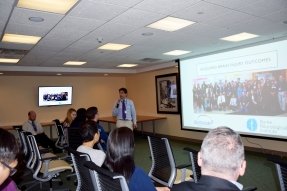Blythedale-Burke Mark Milestone in New Pediatric Neurotechnology System

Over the course of 12 months, data was collected from thousands of neurological tests on more than 40 pediatric patients with brain injuries using a system developed by researchers at Burke Neurological Institute and utilized in practice by clinicians at Blythedale Children’s Hospital.

The information gathered informs both clinical care of children with brain injuries and research studies on restoring motor, cognitive and vision function.
Clinicians will be better equipped to understand the trajectory of how children recover from different types of brain injuries - including trauma, anoxia, stroke, tumors and encephalitis. The information is used during interdisciplinary meetings to enable clinicians to target the specific needs of each patient. Dr. William Watson, a neuropsychologist at Blythedale Children’s Hospital, expressed his enthusiasm, “We analyze trends to help us treat and track approaches, educate families about what to expect, and personalize treatments based on what we’re seeing,” he said.
As for advancing research, the ability to access a repository of big data will help scientists learn more about how brain physiology relates to behavioral function. “The hopes are that, together, we can better diagnosis children, and track changes that happen to the brain in natural recovery and therapeutic intervention,” said Dr. Sudhin Shah, scientific director of the Cognitive Recovery Program. “Once it’s put all together, it could help make more accurate prognosis and close gaps in in our understanding of how the brain changes during recovery.”




